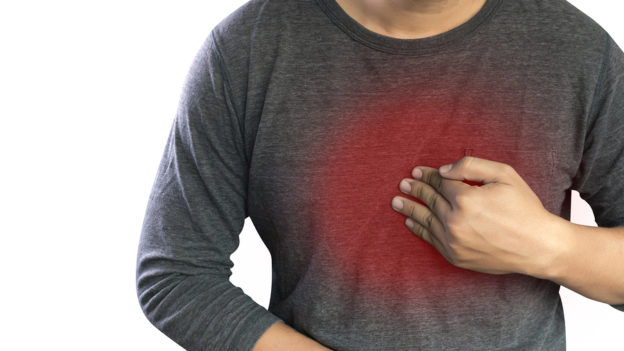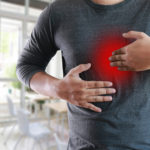By David Blyweiss, M.D., Advanced Natural Wellness
May 1, 2019
The number of patients I have who think they have gastroesophageal reflux disease (GERD) is startling. Some of them received the diagnosis from their previous physician. Others have self-diagnosed their heartburn as GERD.
And most of them slug down heartburn meds like they’re candy.
Well let me tell you a little-known fact about how most doctors diagnose gastric reflux.
In a large number of cases, primary care providers perform something called a proton-pump inhibitor (PPI) test. It’s a super easy test. But it’s extremely unscientific.
In the first step, your doc identifies your symptoms. In the second, he or she sends home with a PPI like Nexium, Prilosec or Prevacid.
Then, if you feel better two weeks later (the third step), you get your diagnosis. You are told you have GERD.
MD Exposes the Hidden Danger to Your Eyes

When your eyesight starts to fail, it's a real problem. Suddenly you can't go to the grocery store... you can't get to the doctor if you have an emergency... you can't meet your friends for dinner…
Your "regular" doctor doesn't have time to keep up with the latest research. And the same goes for eye doctors. They go to school to learn how to fit you for glasses and contacts, but have no way of preventing the damage and loss of eyesight that threatens your freedom and independence.
Let me show you something that explains a LOT about how your eyes work.
In my FREE Special Report, I'll show you a HUGE, untapped resource for your eyes that safely and naturally restores clear, effortless eyesight.
Click here to get started...
But does that mean you really have GERD?
Nope.
As it turns out, about 51% of non-GERD patients (as proven via esophageal PH testing) are diagnosed with GERD using this method. The PPIs helped improve their discomfort. But the source of their discomfort isn’t actually caused by reflux.
So the test is pretty useless.
And by the way. If you’ve self-diagnosed yourself with reflux and started taking PPIs with good results, you’ve just administered your own, personal PPI test. But it’s not any more accurate than doing it under a doctor’s supervision.
In the meantime, you’re popping some seriously harmful medications on a daily basis. It doesn’t matter whether they are prescription or over-the-counter – the dangers are equally as devastating.
PPIs rob your body of magnesium, calcium and B12. They’re linked to a 44% higher risk of dementia and more than a four-fold chance of kidney damage and injury. They increase your odds of a heart attack and double your risk of developing stomach cancer.
PPIs weaken your bones and boost the likelihood of a hip or spinal fracture. They also strip away beneficial bacteria in your gut, leaving you open to antibiotic resistant infections like clostridium difficile. (This is a “super-bug” that causes diarrhea and colon inflammation.)
When they originally came on the market as prescription only medication, physicians were warned (in writing) that we were to prescribe them for no more than 6 weeks…now some are over the counter taken for years.
Are You Suffering From...
- Love handles and a pot belly
- Romance that isn't what it used to
- Forgetfulness and inattention
- Low (or no) strength and endurance
- A sex drive that's shifted into neutral...or worse
If so...you may have Mature Male Burnout. Click here to discover more about this unique condition and what you can do about it.
So let’s get real and take an honest look at what’s causing your gastrointestinal distress.
A Crazy Little Thing called Hypochlorhydria
Hypochlorhydria is a deficiency of hydrochloric acid in the stomach. And here in my own practice, I find that it is frequently one of the roots of maldigestive issues.
Yet here we are. Gastrointestinally-challenged people across America are popping these risky acid-depleting pills like they are M&Ms when, what they really need to do, is produce more of these acids and enzymes! (Just imagine that. Another of Big Pharma’s “cures” that is worse than the health condition itself.)
So let’s take a look at a pretty accurate test I’ve developed on my own to dispel the PPI theory.
Instead of reaching for that heartburn medication, try this;
Take a tablespoon of apple cider vinegar in a glass of water the next time heartburn strikes. If the pain disappears or gets remarkably better, that’s a pretty good indication that your body isn’t producing enough hydrochloric acid.
In this case, you can boost your body’s natural production of stomach acid by taking 325 to 650 mg of betaine HCL with pepsin at the beginning of each meal, the lower dose with smaller meals. (If you experience a slight burning sensation in the pit of your stomach, just decrease the amount next time you take it.)
If it turns out that you truly are suffering from acid reflux, I suggest working with your doctor to find a safer remedy. Weaning off PPIs will take longer the longer you’ve taken them; you’ve inhibited the proton pumps in your stomach for some length of time, so the body made more depending on how long they’ve been used. (Taking 500 mg of mastic gum capsules twice a day with 75 mg of zinc carnosine for three to four weeks can help while you make the transition away from a PPI.)
You’ll also want to repair any damage caused by reflux and acid-blocking drugs. For that, try deglycyrrhizinated licorice (DGL). It can help ease your heartburn symptoms while repairing the mucosal lining of the stomach. Simply chew two DGL tablets before eating or whenever heartburn strikes.
In the meantime, it’s important to recognize that your lifestyle plays a crucial role in your gastrointestinal health.
- Foods that are fatty or acidic can lead to distress. Simple changes like choosing lean, grass-fed meats and opting for melons, kiwi, pears and peaches over citrus can count for a lot. Cutting down on your coffee and alcohol intake can also go a long way in relieving symptoms.
- If you’re overweight, it could be causing a backflow of acid into the esophagus. So it’s a good idea to start engaging in activities and eating habits that can help drop those excess pounds. In the interim, elevating your head during sleep can help.
- Eat small, healthy meals throughout the day. Overeating is a number one reason for gastrointestinal discomfort. And please… skip the late night Do stop eating your last meal at least three hours before bedtime. It’s nothing more than an invitation for heartburn and reflux.
- Forego soda and sparkling water, no matter what time of day. The carbonation in these beverages places a great deal of pressure on your esophagus. This, in turn, promotes reflux. Opt for water, herbal teas and low-acid smoothies.
- Oh and your mother was right, chew your food! Chew it to smoothie consistency before swallowing to give your salivary gland enzymes the time they need to begin digestion.
SOURCES:
Bytzer P, et al. Limited ability of the proton-pump inhibitor test to identify patients with gastroesophageal reflux disease. Clin Gastroenterol Hepatol. 2012 Dec;10(12):1360-6.
Hart E, et al. Proton Pump Inhibitors and Risk of Acute and Chronic Kidney Disease: A Retrospective Cohort Study. Pharmacotherapy. 2019 Feb 18.
Gomm W, et al. Association of Proton Pump Inhibitors With Risk of Dementia: A Pharmacoepidemiological Claims Data Analysis. JAMA Neurol. 2016 Apr;73(4):410-6.
Shah NH, et al. Proton Pump Inhibitor Usage and the Risk of Myocardial Infarction in the General Population. PLoS One. 2015 Jun 10;10(6):e0124653.
Cheung KS, et al. Long-term proton pump inhibitors and risk of gastric cancer development after treatment forHelicobacter pylori: a population-based study. Gut. 2018 Jan;67(1):28-35.
Yu EW, Bauer SR, Bain PA, Bauer DC. Proton pump inhibitors and risk of fractures: a meta-analysis of 11 international studies. Am J Med. 2011 Jun;124(6):519-26.
Jackson MA, et, al. Proton pump inhibitors alter the composition of the gut microbiota. Gut. Published online first Dec 2015.
Choudhry MN, et al. Overuse and inappropriate prescribing of proton pump inhibitors in patients with Clostridium difficile-associated disease. QJM. 2008 Jun;101(6):445-8.







